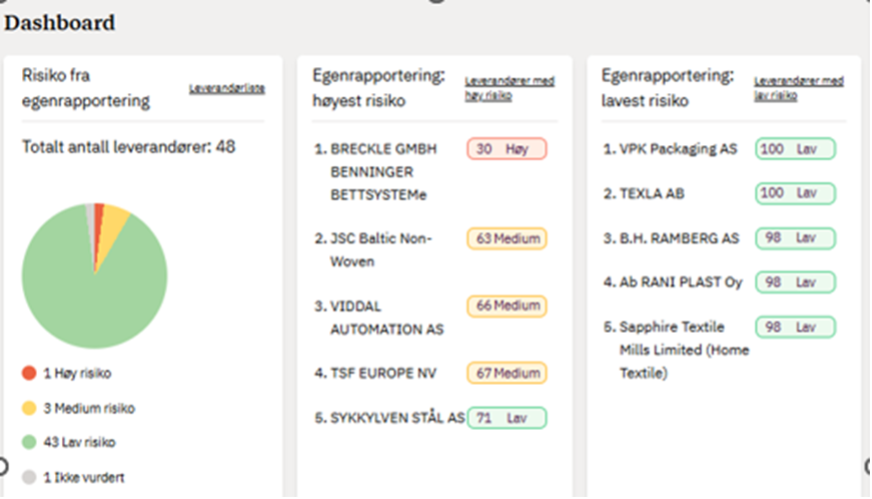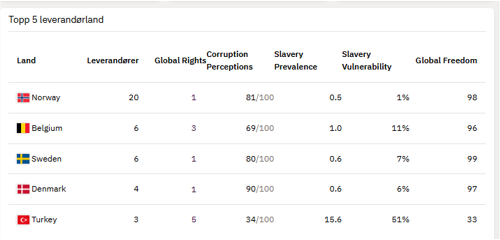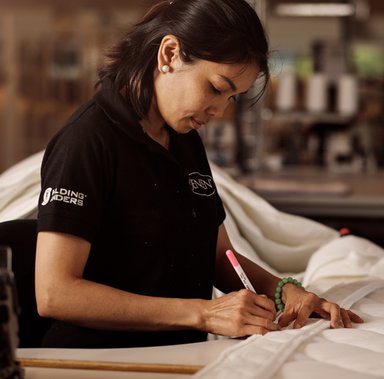The Transparency Act – Account of Jensen’s due diligence assessments
2025 Transparency Act – Hilding Anders Norge AS
This due diligence assessment has been conducted in accordance with the Norwegian Transparency Act (Act on Business Transparency and Work with Fundamental Human Rights and Decent Working Conditions) and is aligned with the OECD Guidelines for Multinational Enterprises.
Hilding Anders Norge AS / Jensen Beds is part of the Hilding Anders International AB group, which is the largest bed manufacturer in Europe. Jensen is one of two premium brands within the group. Jensen has an annual turnover of approximately NOK 500 million and employs 125 people. Our production includes beds, mattresses, and accessories such as headboards, legs, bed side tables, etc. All our products meet strict environmental requirements and are certified with Type 1 ecolabels according to the ISO 14024 standard.
Our customers are B2B in the Nordic region and large parts of Europe, with some presence in Asia. In addition, we offer a contract collection for the hotel market.
In 2022, we established our own B2C distribution of Jensen Beds in Stockholm, and to a lesser extent, in Svelvik.
Hilding Anders International AB has developed ethical guidelines, a Code of Conduct, which is distributed to and signed by our partners. You can find the document here. By signing, our partners commit to conducting their business in a manner that respects fundamental human rights and ensures decent working conditions.
It is important for us to ensure that our entire value chain safeguards workers' rights in accordance with the requirements of the Transparency Act and the OECD Guidelines.
Jan Trygve Jensen
Content
- Methodology
- Our Approach
- Definitions
- Anchoring Responsibility Internally and Across Our Value Chain
- Goals and Collaboration
- Our Risk Areas
- Follow-up and Measures
- Contact Information
This report is our account of having carried out due diligence assessments in accordance with the requirements of the Transparency Act. We begin by providing a general description of our organization, policies, and routines for handling potential adverse impacts on fundamental human rights and decent working conditions. We then outline the main findings and results from the due diligence assessment. Finally, we summarize planned measures to be implemented after the summer to prevent or mitigate the risk of negative impacts.
Methodology
Through our due diligence assessments, we have mapped and assessed the risk of adverse impacts related to human rights and decent working conditions, based on analysis of our supply chains. In accordance with legal requirements, we have primarily focused on our direct suppliers. In cases where input factors or sourcing occur from countries with a high risk of human rights violations and lack of decent working conditions, we go a step further to assess how our suppliers manage their own subcontractors.
Our Approach
The Transparency Act requires continuous due diligence assessments, meaning that our compliance work is an ongoing process. Our focus is on implementing measures that have the potential to create real and lasting improvement through thorough efforts.
Definitions
- Fundamental human rights refer to the internationally recognized human rights described in documents such as the UN Covenant on Economic, Social and Cultural Rights (1966), the UN Covenant on Civil and Political Rights (1966), and the ILO Core Conventions on fundamental principles and rights at work.
- Decent working conditions mean work that respects fundamental human rights, ensures health, safety, and environmental protection at the workplace, and provides a living wage.
- Due diligence assessments refer to the process by which a company identifies whether it directly or indirectly contributes to adverse impacts, in line with the OECD Guidelines. In other words, a mapping of working conditions across all processes used from start to final delivery of the company’s products and services.<
- Supply chain refers to the chain of suppliers and subcontractors that deliver or produce goods, services, or other input factors that are part of the company's provision of services or manufacturing of products, from raw material to finished product. Business partner refers to anyone who delivers goods or services directly to the company but is not part of the supply chain.
Anchoring Responsibility Internally and Across Our Value Chain
Responsibility is one of our core values at Jensen Beds. We take responsibility for both people and the environment by certifying our products with the Nordic Swan Ecolabel. We also require that all our suppliers sign our Code of Conduct. This document outlines our responsibility to ensure good ethical and environmental practices. We implement this internally by introducing ethical guidelines to all new employees, and we extend it through our supply chain and the communities in which we operate.
A key part of this effort is to ensure that the products and services we deliver do not violate our ethical guidelines or Code of Conduct. Our suppliers must be able to account for where goods ordered by us are produced. Additionally, we may request further information about how these suppliers work to uphold human rights and ensure decent working conditions.
As part of our due diligence process, we use the digital platform and services of Factlines. Factlines AS is a Norwegian-owned, independent company specializing in the monitoring of ethical, social, and environmental standards in supply chains. Factlines offers advice and develops services with digital support to obtain effective and verifiable information directly from suppliers and sub-suppliers.
By conducting a thorough due diligence assessment, we have analyzed our business areas to identify any potential concerns within the supplier's entire value chain. We take responsibility by carrying out annual physical supplier visits to follow up on responses that require actions or improvements. We have also established routines for audit questions and follow-up visits with suppliers.
It is essential to prevent dishonesty, disloyalty, or corruption from occurring. This applies to all the company's trade and transactions in every country where the company or its subsidiaries and business partners operate. What is considered bribery is regulated by the laws of each country. Hilding Anders would like to emphasize that we do not accept any commissions from suppliers.
If any employee of the company, either openly or implicitly, requests a commission of any kind, we ask the supplier to immediately report this to Hilding Anders. This can be done directly to Hilding Anders International (by reporting to any member of the Hilding Anders management team), or through the following whistleblower page:
https://secure.ethicspoint.eu/domain/media/en/gui/106802/index.html
Goals and Collaboration
We believe that long-term collaboration delivers results, and we value strong relationships and cooperation with suppliers and other business partners to achieve shared goals and solutions. Through this work, we contribute to Sustainable Development Goal 17: Partnerships for the Goals, including sub-goal 17.17, which encourages partnerships between various stakeholders (Encourage and promote effective public, public-private and civil society partnerships, building on the experience and resourcing strategies of partnerships).
No company is too small to work actively with sustainability, and we expect our suppliers to show a willingness to collaborate and implement necessary improvements.
Our objectives for the businesses we collaborate with are:
- All must have adopted ethical guidelines that at a minimum comply with the requirements of the UN Global Compact and the ILO Core Conventions, and ensure that these are communicated to all employees, business partners, and suppliers.
- All must have established a strategy for sustainability / corporate social responsibility.
- Over time, suppliers must achieve a total score indicating low or medium risk.
We also continuously monitor the ITUC GRI - Home (globalrightsindex.org) which annually ranks countries based on how workers are treated and highlights the worst regions in the world. We compare this information with the responses we receive through our surveys.
Our Risk Areas
We currently have only one supplier that is categorized as high risk, and we are working diligently to find a replacement for this supplier. The other three are described as medium risk.


Autumn 2024, we travelled to Turkey, a country with a high risk of labour and human rights violations, corruption, and modern slavery. We visited our three textile suppliers, conducted audits with management, and inspected the factory floors. One of the major challenges was the lack of English proficiency, so we brought an interpreter to translate the dialogue during the visit.
After the visit, we ensured that the person responding to our survey has both a good understanding of the business and proficiency in English. We also collected many photos documenting good working conditions, responsible management, and satisfied employees.
Follow-up and measures
Based on this year’s responses and our goals, we will follow up after the summer with suppliers that have potential for improvement. We will also follow up with some high-performing suppliers and select a few for physical audits. We have identified 43 suppliers in the low-risk category, including our Pakistani supplier, Sapphire Textile. Although we have no suspicions regarding this supplier, we will still conduct a deeper review of Sapphire Textile. According to the Global Rights Index, Pakistan has a labour rights rating of level 5 (the same as Turkey), which represents a high risk. With over 2,000 employees, it is important for us to ensure thorough documentation. Due to the long travel distance, we will initially use digital solutions. Should any suspicions arise, we will contact the parent company to investigate whether colleagues nearby can assist, before considering a possible trip.
In addition, we will:
- Dive deeper into suppliers who, for various reasons, have not yet adopted a sustainability strategy, and jointly set a deadline to implement one.
- Follow up with suppliers who have not yet adopted ethical guidelines and/or have not distributed these to their subcontractors, and request that this be implemented.
- Follow up with suppliers that have not established routines or systems for monitoring their own suppliers, and request that these be implemented.
- Follow up with each supplier lacking an overview of their value chain and raw materials/components.
- Follow up with suppliers that are not compliant with local environmental laws and regulations.
Contact Information
The Transparency Act §6 – right to information:
• Inquiries: email info.no@hildinganders.com.
• All inquiries will be recorded and logged, and we will respond as quickly as possible and within three weeks.


